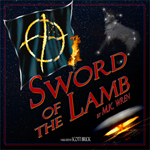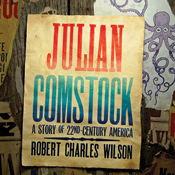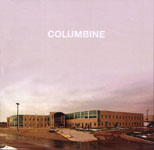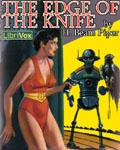
 Sword of the Lamb
Sword of the Lamb
By M.K. Wren; Read by Scott Brick
MP3 Download – 21 hours, 27 minutes – [UNABRIDGED]
Publisher: Scott Brick Presents
Published: 2008
Themes: / Science Fiction / Epic / Secret Societies / History / Political Intrigue /
I was thrilled to hear that SFFaudio scored a copy of Sword of the Lamb from Brick by Brick, narrator Scott Brick’s audiobook production company. Hearing Scott wax eloquent on the audio entry for his blog, I was hooked and begged to review it. Among other things he says:
“I loved it right from the beginning – I loved its format, I loved its pathos, I loved its political intrigue, and more than anything else, I loved its characters. The relationship between the two central characters, Alexand DeKoven Woolf and his brother Richard, is one of the greatest I’ve ever read. It is amazingly well-executed, rich in detail and nuance, and unashamedly sentimental. …
As you might have guessed, I tore through the next two volumes just as quickly as the first, and found myself profoundly moved. THE PHOENIX LEGACY is a huge, sprawling epic of political intrigue in the 33rd Century, in which mankind has witnessed amazing technological advancements, yet its society has devolved into a new kind of feudalism. It’s a tale of class struggles across solar systems, it’s THE WINDS OF WAR set in outer space, it’s A TALE OF TWO CITIES meets DUNE, it’s… it’s its own unique creation, a gem that most people, even most science fiction fans, don’t know about.
I’ve asked myself why this is, why this gem exists in bookstores everywhere but has largely gone ignored, but it defies explanation. Maybe it’s because of those damn covers; they really were bad. …”
Or … maybe, it’s because the books, or at least the first book, is not as brilliant as A Tale of Two Cities or Dune. I never read The Winds of War but I have read Gone With the Wind many times. Sword of the Lamb is not as brilliant as Gone With the Wind either. Oh how I hate to be the only person that Scott Brick ever introduced to these books who did not fall in love with them, but there you go. I wanted to love The Sword of the Lamb, I really did. However, every time I felt myself falling for it, the author tripped me up.
First, a brief synopsis of The Sword of the Lamb. Set in the 33rd century, mankind has long since populated many planets. Their government, called The Concord, looks as if it is about to take that inevitable downward slide into a dark age, which would be the third in known history. This is a feudal system governed by the Lords of trading houses and supported by two servant castes, who are actually not much more than slaves. We see the story through two brothers of the DeKoven Woolf House, Alexand and Rich. Alexand is the eldest son and being groomed for the power and responsibility he will eventually inherit. Rich, fragile because of a childhood illness, takes the path of scholar and sociologist. Both boys have been greatly influenced by their tutor who was a passionate supporter of the downtrodden lowest “bond” class. The combination of logic and insistence that “bonds” are people who deserve more than they receive sends both young men down paths they could not possibly foresee, including involvement with the underground movement, The Society of the Phoenix.
This is a book where the relationships shine. The brothers are very different but have an unbreakable understanding and bond. Alexand and his love, Adrien, likewise have a meeting of minds and hearts that leaves them inseparable. Make no mistake about it, these are indeed epic characters and we want to see them succeed and achieve their heart’s desire no matter what the cost. Wren has a gift for dialogue and even seemingly unimportant situations are compelling and interesting when there are characters involved. She uses this to great advantage in painting characters in the book.
Likewise, her plot is interesting. It is true that one can foresee the major story lines before they come along. (Let’s face it, Alexand and Adrien had it much too easy in their match. It practically screamed “star-crossed lovers coming next scene!”). However, that is forgivable if the story is told well. Much of the time, Wren pops in surprising little twists and turns in the broader plot that make the story much more interesting and keep us thinking.
With all that going for it, what could go wrong?
Info-dumps.
Nothing can kill a story like too much exposition and this book has it in spades. Wren can’t resist from the very beginning when the tutor is going to bid the boys goodbye and decides to give them one last quiz. (Hey, what easier way to just throw a thousand years’ worth of history at the reader?) She can’t resist making us listen to old computer tapes of university lectures from leading sociologists about a woman’s diary during one of the terrible societal breakdowns long ago or recordings of insightful university lectures. She can’t resist even when we are being introduced to that long awaited encounter with the actual Society of the Phoenix. We’re excited! We’re seeing a secret society! But first, let’s have someone sit around and think at very great length about how they are organized and who hates who. Gee, who doesn’t love a sharp rap over the knuckles and a history lesson before beginning an adventure?
In short, the author doesn’t trust her characters to be able to carry the story without giving us a lot of background that doesn’t matter at all. Things are getting going, we are in a white-heat to see what will happen next, and she grinds it all to a halt with yet another long, boring description. By the time she’s done, we barely care about the story any more. At least, that’s how it hit me. Luckily, her genius with characters was such that I would reluctantly be pulled back into the story. Only to have her once again stick out her foot and trip me on the way to the finish line. Overall, I tend to blame the book’s editor. This is something they are supposed to catch. And didn’t.
To be fair this may be something that stands out in audio form much more than on the printed page. I would have been skipping, or at best skimming, those long expositions in a regular book. Scott Brick is an enormously talented narrator and he pours his heart and soul into the book as we would expect since he loves it so. I’m not sure he is capable of doing a bad job of narrating anything. But even he couldn’t lessen the abyss of those sections. In the end, I finally would just skip ahead as best I could to get to the spots where the story would pick up and move forward. It was always worth it. The story was good. The characters, of course, were great. The narration was fantastic. But those info-dumps … they were killers.
Perhaps I’m nitpicking. Maybe most people don’t loathe info-dumping the way that I do. Fair enough. However, let’s consider those other epics to which this book was compared. A Tale of Two Cities. Gone With the Wind (my own addition, I know). Dune. It didn’t matter if we knew much or, indeed, anything, about the French Revolution, the American Civil War, or Arakis and the Empire. The authors all managed to get in the information we needed, and even a little more, without having our eyes glaze over. In fact, we barely noticed that we were being fed background information at all. That is the difference between a truly classic epic novel and a pretty good book that’s kinda long.
Sadly, Sword of the Lamb is the latter.
Posted by Julie D.

 It’s been a while since we talked about a Podiobooks.com podiobook, so here’s one that popped into my email just today. Mick describes his podcast like this:
It’s been a while since we talked about a Podiobooks.com podiobook, so here’s one that popped into my email just today. Mick describes his podcast like this:






